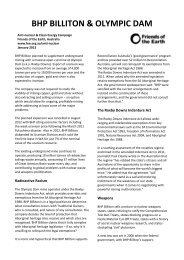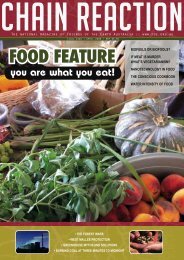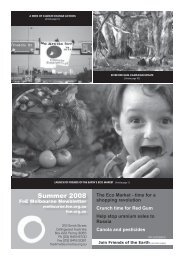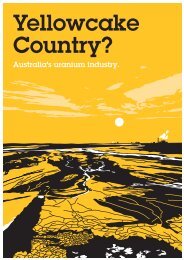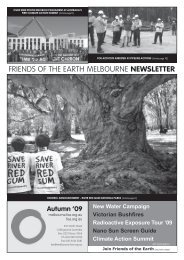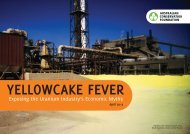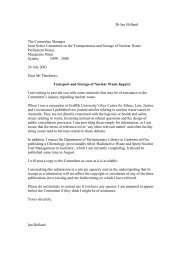Thirty Years of Creative Resistance - Friends of the Earth Australia
Thirty Years of Creative Resistance - Friends of the Earth Australia
Thirty Years of Creative Resistance - Friends of the Earth Australia
You also want an ePaper? Increase the reach of your titles
YUMPU automatically turns print PDFs into web optimized ePapers that Google loves.
works with and lobbies various political<br />
parties as it needs to. While FoE remains<br />
independent <strong>of</strong> political parties, many key<br />
individuals and some local groups were<br />
involved in <strong>the</strong> creation <strong>of</strong> local Green<br />
party branches. In 1986, reflecting a<br />
broader internal debate, FoE Oakleigh in<br />
south eastern Melbourne stated that while<br />
in <strong>the</strong> short term <strong>the</strong> “<strong>Australia</strong>n Democrats<br />
are our best pragmatic option, <strong>the</strong>ir union<br />
bashing is unacceptable.” The solution<br />
<strong>the</strong>y saw was to advocate for <strong>the</strong> creation<br />
<strong>of</strong> a separate Greens party.<br />
The bulk <strong>of</strong> FoE’s work is undertaken by<br />
local groups, with each responsible for its<br />
own structure, fundraising, campaigns and<br />
style <strong>of</strong> campaigning. This means <strong>the</strong>re is<br />
considerable diversity between <strong>the</strong> groups<br />
and <strong>the</strong> model is based on <strong>the</strong> idea that<br />
local people will know best how to respond<br />
to local issues and problems. FoE’s<br />
support structure is accessible to smaller<br />
pressure groups, and <strong>of</strong>fers guidelines and<br />
philosophies that help with <strong>the</strong> running <strong>of</strong><br />
such organisations.<br />
FoEA’s work is mostly done on a voluntary<br />
basis, and a large proportion <strong>of</strong> <strong>the</strong> active<br />
members <strong>of</strong> most groups are women.<br />
FoEA has proactive gender policies, and<br />
many <strong>of</strong> <strong>the</strong> local groups have similar<br />
policies in <strong>the</strong>ir constitutions. FoEA is<br />
committed to addressing gender through<br />
ongoing reviews <strong>of</strong> gender issues. It also<br />
has a policy <strong>of</strong> encouraging indigenous<br />
people and people from non English<br />
speaking backgrounds to apply for paid<br />
employment in <strong>the</strong> organisation. Largely<br />
as a result <strong>of</strong> lobbying by Linnell Secomb,<br />
FoEM adopted an affirmative action<br />
employment policy in <strong>the</strong> early 1980s,<br />
setting a ratio <strong>of</strong> women employees to men<br />
at 60:40.<br />
FoE is perhaps best known for its<br />
long-standing work on uranium. It has<br />
campaigned against all aspects <strong>of</strong> <strong>the</strong><br />
nuclear cycle since its inception, including<br />
<strong>the</strong> lean years <strong>of</strong> <strong>the</strong> late 1980s and early<br />
1990s, when few o<strong>the</strong>r green groups<br />
maintained an interest in this issue.<br />
However, FoE in <strong>Australia</strong> also has a long<br />
tradition <strong>of</strong> working on ‘smoggy’ or ‘brown’<br />
...................................................................................................................................................................................................<br />
issues, including hazardous chemicals,<br />
waste minimisation, high temperature<br />
incinerators, urban transport and energy.<br />
Issues have changed and evolved over<br />
<strong>the</strong> years, as individuals joined or left <strong>the</strong><br />
Federation and external factors influenced<br />
campaign priorities. In <strong>the</strong> early twentyfirst<br />
century, our key priorities continue to<br />
include civil and military nuclear issues,<br />
climate justice, food and sustainable<br />
agriculture, corporations, population<br />
and climate refugees, forests and<br />
plantations and on-going collaboration and<br />
engagement with a range <strong>of</strong> local, national,<br />
and international issues.<br />
Anti-Nuclear, rally in Melbourne, mid 1980s.<br />
Many groups have grown out <strong>of</strong> FoE<br />
over <strong>the</strong> years and literally thousands<br />
<strong>of</strong> activists have worked from <strong>the</strong>re<br />
under many names and organisational<br />
structures. Some <strong>of</strong> <strong>the</strong>se have included<br />
<strong>the</strong> ‘Ride Against Uranium’ (from<br />
Melbourne to Canberra in <strong>the</strong> late 1970s),<br />
<strong>the</strong> Movement Against Uranium Mining<br />
(MAUM), <strong>the</strong> Antarctica campaign, <strong>the</strong><br />
Fund for Animals, Project Jonah, and<br />
various early forms <strong>of</strong> transport and bike<br />
advocacy groups including <strong>the</strong> NSW Bike<br />
Institute.<br />
All <strong>of</strong> <strong>the</strong>se diverse groups were originally<br />
FoE initiatives or based in FoE groups<br />
or <strong>of</strong>fices. FoE was also instrumental<br />
in establishing Shareholders for Social<br />
Responsibility, attending <strong>the</strong> AGMs <strong>of</strong><br />
large resource corporations and producing<br />
alternative reports on companies, outlining<br />
environmental destruction and abuses <strong>of</strong><br />
communities and workers rights.<br />
FoE 30 <strong>Years</strong> 5



